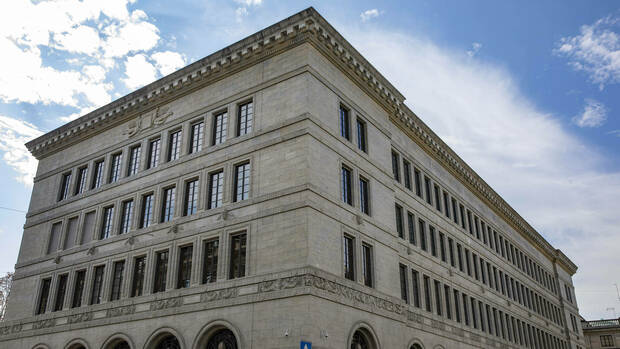In order to ensure appropriate monetary conditions, the SNB intends to intervene in the foreign exchange market if necessary.
(Photo: IMAGO/Future Image)
Zurich There is an inflation rate in Switzerland that most other countries on the European continent can only dream of at the moment: the rate of inflation was 2.2 percent in May – and the trend is falling. But although the Swiss National Bank (SNB) is much more successful in the fight against inflation than the European Central Bank, for example, SNB President Thomas Jordan is sticking to his strict course. On Thursday, the Swiss central bank raised interest rates by 0.25 percentage points to 1.75 percent.
Interest rates are thus rising less sharply than in March, when the interest rate hike was 0.5 percentage points. But it was still too early for a break in the central bank’s rate hike cycle, Jordan justified the step: “There is a risk that inflation will solidify above two percent.”
The rise in interest rates is necessary “to ensure that inflation returns to price stability in the long term,” Jordan said. The SNB defines price stability as an inflation rate of zero to two percent.
The fact that Switzerland is doing better than many European economies is partly due to its strong domestic currency: the SNB started raising interest rates earlier than the ECB and also maintained the value of the Swiss franc against the euro and dollar by intervening in the foreign exchange market.
Over the course of a year, the franc has appreciated by 3.5 percent against the euro, and one franc currently costs just under EUR 1.02. The SNB has “strengthened the franc and lowered imported inflation,” explained Jordan. Rising prices for imported goods are therefore less reflected in the domestic inflation rate. In addition, falling oil and gas prices helped the SNB in its fight against inflation.
High electricity and rental prices are delaying the party mood
Nevertheless, the SNB expects an average inflation rate of 2.2 percent for 2023 and 2.1 percent for 2024 – these are values just above the inflation target of the central bank. The fact that Jordan is not yet celebrating victory over inflation is partly due to higher electricity prices and rising rents.
However, Martina Honegger-Romahn, portfolio manager and bond expert at Allianz Global Investors, points out that the consumer price index has recently started to climb again on a monthly basis. “This points to near-term inflationary pressures.”
Added to this is the continuing inflationary pressure from abroad. For comparison: In Germany, inflation was over six percent in May. Honegger-Romahn explains that since the ECB and other central banks in industrialized countries have continued to raise key interest rates, it has become more difficult for the SNB to ensure the stability of the franc.
However, Jörg Angelé, economist at asset manager Bantleon, expects inflation in Switzerland to fall below two percent in the coming year and thus within the SNB’s target range. Therefore, “an end to the rate hike process would be appropriate”.
However, the SNB explicitly reserves the right to raise interest rates again in September. “We are fortunate that inflation is low and that we tightened monetary policy early enough,” Jordan said. Nevertheless, it is important to ensure that the inflation target is met. For Jordan, it’s also about the reputation of his institution.
More: Former Fed Vice Chairman warns of interest rates being too low
